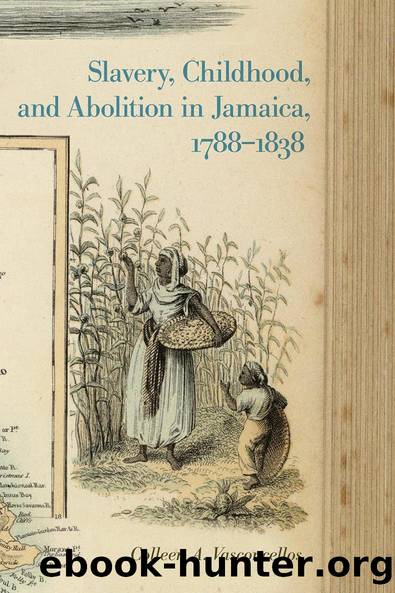Slavery, Childhood, and Abolition in Jamaica, 1788â1838 by Colleen Vasconcellos

Author:Colleen Vasconcellos [Vasconcellos, Colleen]
Language: eng
Format: epub
Tags: History, Caribbean & West Indies, General, Social Science, Children's Studies, Slavery
ISBN: 9780820348025
Google: aPRiCAAAQBAJ
Publisher: University of Georgia Press
Published: 2015-01-15T04:07:08+00:00
Summary
As the abolitionist movement changed the nature of Jamaican slavery, plantersâ ideas of childhood shifted yet again. While planters congratulated themselves on their success in socially conditioning their enslaved children into more profitable investments, childrenâs roles in the plantation complex evolved with this new generation of slaves. The planters who once concerned themselves only with production and profit now became obsessed with the moral upbringing of the children on their estates. Enslaved children had become viable economic investments to the plantation economy; now planters began to attach a social value to them as well. Their evolution into âcivilizedâ and moral commodities still attached enslaved children to the economic viability of the plantation economy, but their roles on the island shifted their identity from slave to future freedman as Jamaican planters accepted the inevitability of abolition. Consequently, education began to define freedom for the slave community, at least as much as their owners would allow.
As planters tried to erase the cultural traditions, beliefs, and practices enslaved children retained from their parents and kinship groups, the slave community witnessed a transformation in the education of their children. Despite such interference, enslaved Jamaicans struggled to raise their children as they saw fit. Although archival sources do not indicate the extent to which the children transferred what they learned to the rest of the slave community, their Christian education certainly challenged the traditions and beliefs practiced by their parents and kinship groups. As we will see, the apprenticeship period only intensified the educational conditioning of the newly freed enslaved population. Although Reverend John Barry testified before the House of Commons in 1832, âNegro children are the most dutiful and obedient children, generally speaking, that I have ever known,â Sir Michael Clare, a physician practicing in Jamaica since 1802, testified that while the moral licentiousness of the enslaved population appeared to be improved, it was not.83 Furthermore, apprenticeship intensified the ideas of freedom already formulating in the slave community. At the same time, however, one final change occurred in planter opinion toward enslaved children as the abolition of slavery in the British colonies brought the changing nature of childhood in Jamaica full circle.
Download
This site does not store any files on its server. We only index and link to content provided by other sites. Please contact the content providers to delete copyright contents if any and email us, we'll remove relevant links or contents immediately.
| Africa | Americas |
| Arctic & Antarctica | Asia |
| Australia & Oceania | Europe |
| Middle East | Russia |
| United States | World |
| Ancient Civilizations | Military |
| Historical Study & Educational Resources |
Cat's cradle by Kurt Vonnegut(15331)
Pimp by Iceberg Slim(14481)
4 3 2 1: A Novel by Paul Auster(12370)
Underground: A Human History of the Worlds Beneath Our Feet by Will Hunt(12085)
The Radium Girls by Kate Moore(12014)
Wiseguy by Nicholas Pileggi(5769)
The Fire Next Time by James Baldwin(5429)
Perfect Rhythm by Jae(5396)
American History Stories, Volume III (Yesterday's Classics) by Pratt Mara L(5297)
Paper Towns by Green John(5177)
Pale Blue Dot by Carl Sagan(4996)
A Higher Loyalty: Truth, Lies, and Leadership by James Comey(4950)
The Mayflower and the Pilgrims' New World by Nathaniel Philbrick(4487)
The Doomsday Machine by Daniel Ellsberg(4484)
Killers of the Flower Moon: The Osage Murders and the Birth of the FBI by David Grann(4435)
The Sympathizer by Viet Thanh Nguyen(4384)
Too Much and Not the Mood by Durga Chew-Bose(4337)
The Borden Murders by Sarah Miller(4310)
Sticky Fingers by Joe Hagan(4188)
